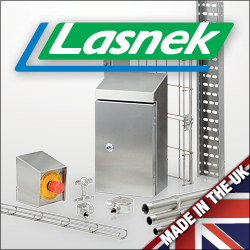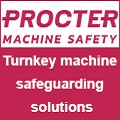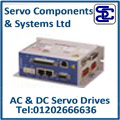
Posted to News on 18th Apr 2008, 19:37
Software for robotic grinding and finishing of castings
Improved automated grinding and finishing of castings is now possible with the launch of a new software function called RobotWare Machining FC for use with ABB robots.
At the heart of RobotWare Machining FC are two advanced software features. The first, FC Pressure, lets robots grind, polish or buff castings while maintaining a constant pressure between the tool and the work surface. The second software feature, FC SpeedChange, enables a robot to deburr or deflash part lines and surfaces of castings at a controlled speed, slowing down when encountering excessive burrs.
Traditionally, the foundry finishing process has been extremely labour-intensive, with inconsistent end product quality because castings are ground, deburred and polished by hand. Until now, robots used for this task have been position controlled, moving according to defined positions and speeds. If the robot is struggling to trace the programmed path, the robot's servo will increase power until maximum torque, causing a collision with the excess material along the way. As a result the robot stops, the tool breaks or the workpiece is damaged. To limit such damage, conventional cast cleaning robots are typically run at a slower pace, which limits productivity.
This conventional approach needs complex and time-consuming programming, as the robot path needs to be as exact as possible. The expectation is that the grinding or polishing will give consistent results. But in reality the cast products are all individual, with different tolerances, and this generates inconsistent process results.
Andreas Eriksson, Product Manager Foundry at ABB Robotics, says: "The new RobotWare Machining FC function removes the bottleneck and greatly increases process efficiency, saving time, raising overall consistency and boosting product quality. One of the last real barriers to productivity improvement in this sector has been lifted."
The benefits include:
- Improved process results and product quality
- Secure controlled contact force in grinding applications gives an improved and consistent product quality
- Reduced programming time
- 80 per cent faster to program grinding applications by allowing the robot to 'feel' the surface
- Shorter cycle times
- 20 per cent faster deburring as the robot adapts to surface defects
- Up to 20 per cent longer tool life as there is consistent wear by avoiding tool and workpiece collisions
FC Pressure software is aimed at processes demanding a high-quality surface finish. It allows the robot to effectively 'feel' its surroundings and follow the casting surface, changing its position in order to apply a constant pressure on the surface, even if the exact position of the surface is not known. As there is a consistent contact, debris, such as a burr, is removed to the same depth. This improved force control accuracy is critical for a good surface finish, where even a 5N force difference can have a significant impact on final quality.
The results are: improved surface finish; the ability to handle variations in castings; minimal risk of damage to the casting surface; and predictable tool wear.
Constant pressure is obtained by adjusting the robot path. Therefore this function is suitable for polishing, grinding and cleaning, where a surface needs to be even and smooth. Typical applications in foundry and metal fabrication include:
- Grinding of water taps, turbine/propeller blades and other types of casting
- Polishing of laptops, mobile phones, electronic parts, water sinks, etc
- Buffing of bumpers, speakers, chromed engine covers, etc
In processes where path accuracy is important and where the finished result must comply with specific dimensions, FC SpeedChange is recommended. With FC SpeedChange, the robot is position controlled and follows a programmed path that maintains a constant material removal rate. It operates at maximum process speed and automatically slows down the robot when the machining forces are too high. When FC SpeedChange is active and if machining forces exceed a certain value, then the path speed will automatically be reduced, thus decreasing forces, minimising changed dimensions due to deflections of the robot arm and subsequently avoiding damaging the part or tool due to stress and heat.
This results in: shorter cycle times; the ability to handle variations in castings; minimal risk of damage to the castings; and predictable tool wear.
FC SpeedChange can be used for:
- Grinding unevenly distributed material on cast surfaces
- Milling along the edge of a work piece
- Deburring along the contours of a work piece
- Deflashing unevenly distributed burrs along a part line on castings
Eriksson says: "Foundry cleaning operations are now much simpler, enabling finished castings to be produced better, faster and cheaper."
ABB Robotics claims that RobotWare Machining FC provides, for the first time, force control in different machining applications where the robot needs to be sensitive to process forces. It comprises advanced software, described above, instructions for machining applications and a computer adapted for force control.
In addition, for full functionality the system requires standard ABB robots fitted with a force sensor, ABB's IRC5 controller housing an interface card linking the sensor to the controller's computer, and cabling between the sensor and the controller.
The force sensor measures the process forces used to adjust the robot's behaviour. For FC Pressure, either a six-degree-of-freedom (6DOF) - that is full force and full torque - or a one-degree-of-freedom (1DOF) force sensor can be used.
For FC SpeedChange, either a 6DOF sensor or an analogue signal representing the machining forces, such as spindle voltage output, can be used. The choice of sensor input depends on the required flexibility of the application. The sensor can be mounted on the robot or on a stationary fixture in any combination with the robot holding the work piece or the tool.
Eriksson concludes: "This ABB solution is fully flexible and can be adopted to almost any machining process or system configuration as required by the customer. All the benefits of RobotWare Machining FC open up a huge potential for increased productivity and higher quality using robot automation."
For more information about the potential benefits of integrating robots into a production process, email [email protected].



















